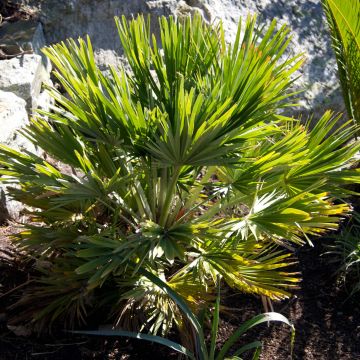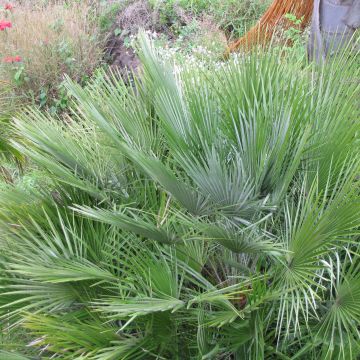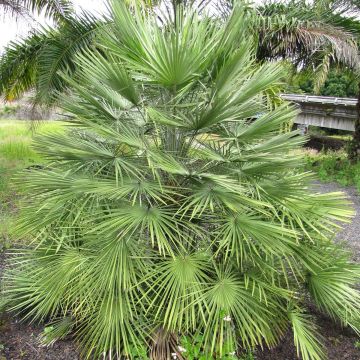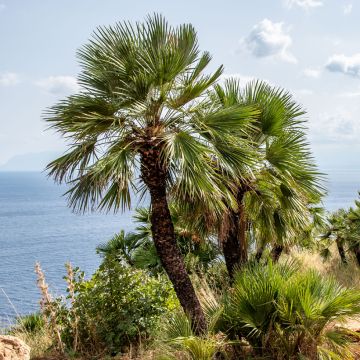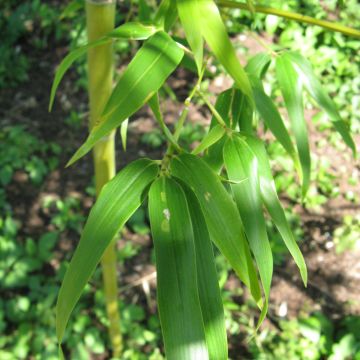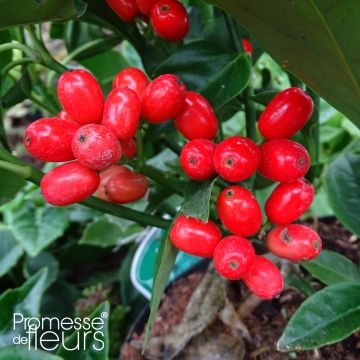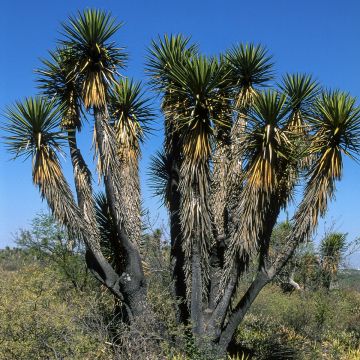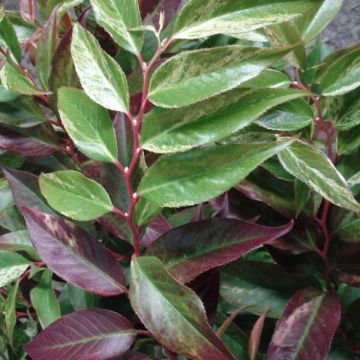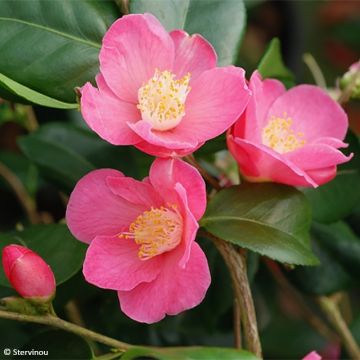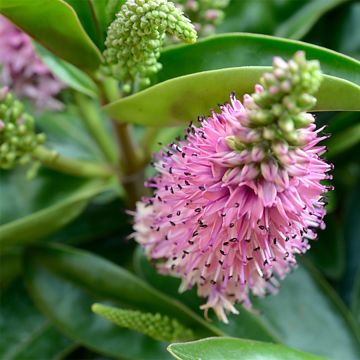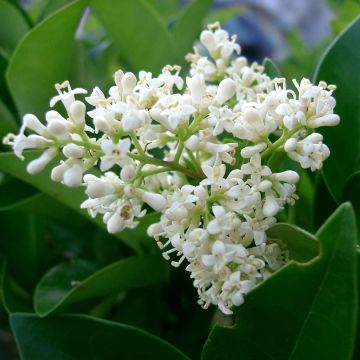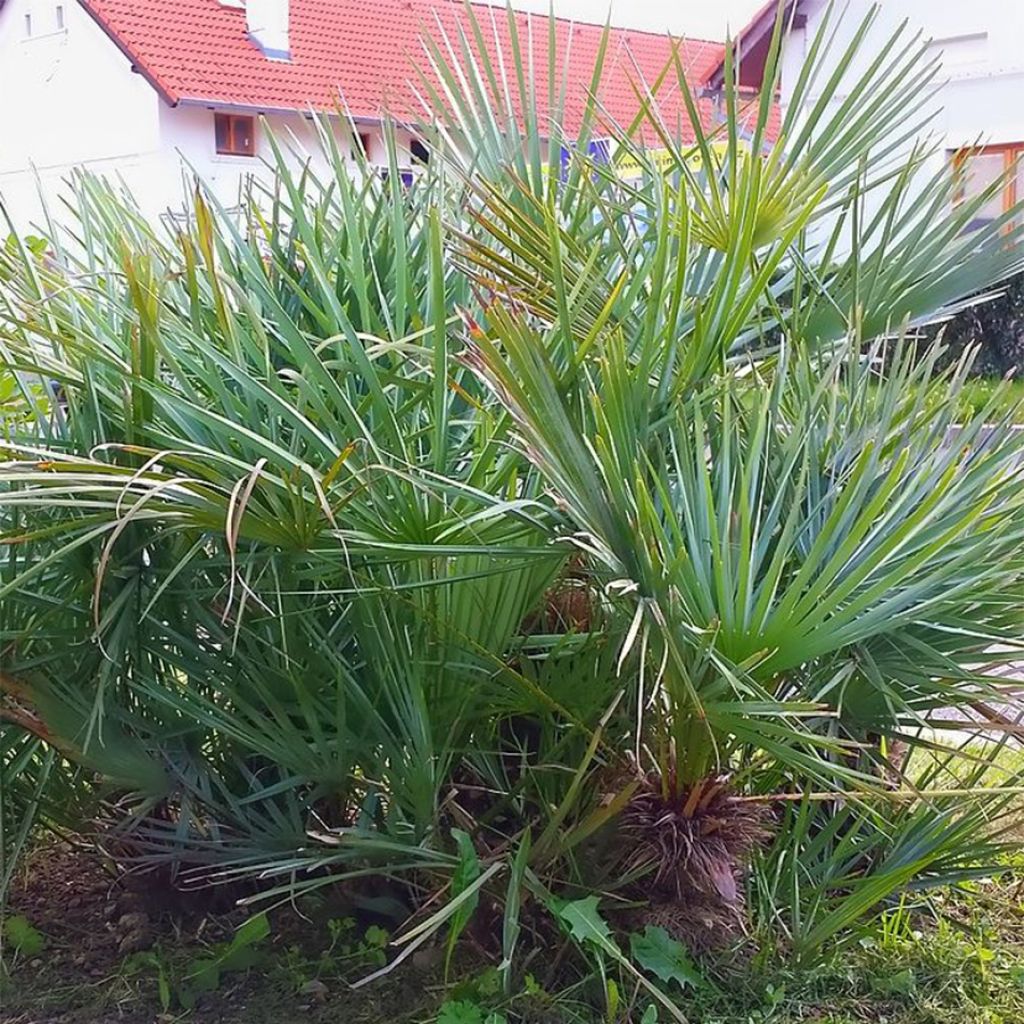

Chamaerops humilis var. cerifera - Dwarf Fan Palm
Chamaerops humilis var. cerifera - Dwarf Fan Palm
Chamaerops humilis var. cerifera
European Fan Palm, Mediterranean Fan Palm
Beautiful plant in perfect health. Very well-grown.
Laurent, 17/08/2022
Special offer!
Receive a €20 voucher for any order over €90 (excluding delivery costs, credit notes, and plastic-free options)!
1- Add your favorite plants to your cart.
2- Once you have reached €90, confirm your order (you can even choose the delivery date!).
3- As soon as your order is shipped, you will receive an email containing your voucher code, valid for 3 months (90 days).
Your voucher is unique and can only be used once, for any order with a minimum value of €20, excluding delivery costs.
Can be combined with other current offers, non-divisible and non-refundable.
Why not try an alternative variety in stock?
View all →This plant carries a 24 months recovery warranty
More information
We guarantee the quality of our plants for a full growing cycle, and will replace at our expense any plant that fails to recover under normal climatic and planting conditions.
Would this plant suit my garden?
Set up your Plantfit profile →
Description
Chamaerops humilis var. cerifera is one of the hardiest varieties of the Dwarf Palm, and may be the one with the most beautiful foliage. Native to Europe and small in size, it can withstand temperatures of around -12 °C (10.4 °F) , for short periods, or even longer in very well-drained soil. The palmate foliage is very ornamental, with a beautiful grey-blue colour, and is arranged in a fan shape at the top of multiple stems emerging from a trunk covered in fibres. It is a plant adapted to a semi-arid climate, very well suited to drought and poor soils, and should be planted in full sun.
A slow-growing shrub of the Arecaceae family, highly appreciated as an ornamental plant, Chamaerops humilis var. cerifera, or var. argentea, is mainly native to Morocco, where it grows in dry habitats, on sandy or rocky soil, by the sea but also up to 1,200 m (3937 ft) in altitude, enduring snow and rather cold temperatures in winter. The plant, described as clumping, produces multiple stems from a single base, forming an upright bush with an arched and spreading habit. Its adult dimensions will reach around 3 m (9 ft 10 in) in height and 2 m (6 ft 7 in) in width, less if grown in pots. The "trunks" are brown and 25 cm (9.8 in) wide in mature specimens, and covered in layers of fibres and leaf scars. The leaves (fronds), elegant and deeply divided, are composed of small, narrow, rigid segments, 30 cm (11.8 in) long, radiating from the petiole armed with sharp spines. Their colour is a steel blue-grey. This plant is generally (but not always) dioecious, meaning that male and female individuals are usually distinct. The fragrant flowers appear in late spring, in the form of a spadix surrounded by a 30 cm (11.8 in) long spathe, containing numerous small beige to yellow flowers, male or female.
This palm tree, along with Trachycarpus fortunei, is one of the easiest to acclimatise. When planted in the ground, it can be placed in isolation, not far from a swimming pool, for example, along with banana trees or yuccas, in an exotic-inspired setting. However, this variety, which is very resistant to drought, will express its full potential in a dry garden or a large rockery. It can be a bit difficult to combine due to its strong personality, but it can still be planted in groups of 3 specimens and surrounded by a carpet of thyme, a sowing of Californian Poppies, or a bed of Felicia. A contemporary garden will adopt it above a tide of white pebbles. It will make a magnificent specimen on a terrace or balcony, planted in a carefully chosen large container.
Report an error about the product description
Chamaerops humilis var. cerifera - Dwarf Fan Palm in pictures
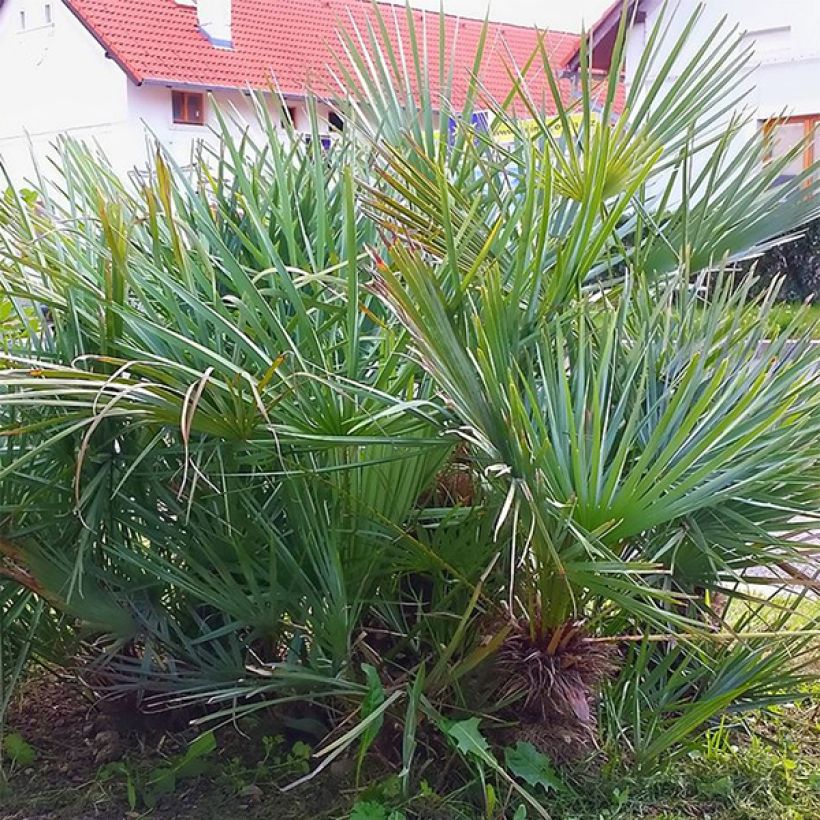

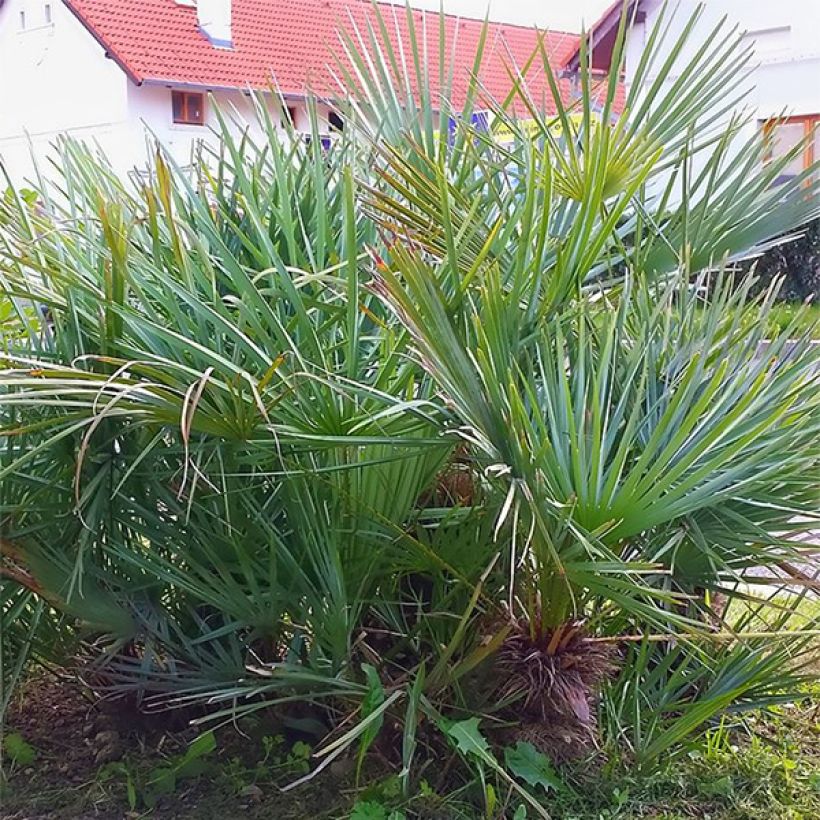

Plant habit
Flowering
Foliage
Botanical data
Chamaerops
humilis
var. cerifera
Arecaceae
European Fan Palm, Mediterranean Fan Palm
Mediterranean
Other Chamaerops
View all →Planting and care
Plant the dwarf palm in a light, well-drained soil, even poor, chalky and dry in summer. Ideally, plant it in a mixture of coarse sand, gravel and garden soil, which will effectively drain winter moisture. Install it in a position sheltered from the cold and dry winds. At temperatures of around -12/-15 °C (10.4/5 °F), it will probably lose its leaves, but the crown will reform in spring. Protect the trunk with a winter cover, and even a thick mulch. Easy to grow, it requires little maintenance except for pruning the oldest leaves close to the trunk.
Planting period
Intended location
Care
-
, onOrder confirmed
Reply from on Promesse de fleurs
Similar products
Haven't found what you were looking for?
Hardiness is the lowest winter temperature a plant can endure without suffering serious damage or even dying. However, hardiness is affected by location (a sheltered area, such as a patio), protection (winter cover) and soil type (hardiness is improved by well-drained soil).

Photo Sharing Terms & Conditions
In order to encourage gardeners to interact and share their experiences, Promesse de fleurs offers various media enabling content to be uploaded onto its Site - in particular via the ‘Photo sharing’ module.
The User agrees to refrain from:
- Posting any content that is illegal, prejudicial, insulting, racist, inciteful to hatred, revisionist, contrary to public decency, that infringes on privacy or on the privacy rights of third parties, in particular the publicity rights of persons and goods, intellectual property rights, or the right to privacy.
- Submitting content on behalf of a third party;
- Impersonate the identity of a third party and/or publish any personal information about a third party;
In general, the User undertakes to refrain from any unethical behaviour.
All Content (in particular text, comments, files, images, photos, videos, creative works, etc.), which may be subject to property or intellectual property rights, image or other private rights, shall remain the property of the User, subject to the limited rights granted by the terms of the licence granted by Promesse de fleurs as stated below. Users are at liberty to publish or not to publish such Content on the Site, notably via the ‘Photo Sharing’ facility, and accept that this Content shall be made public and freely accessible, notably on the Internet.
Users further acknowledge, undertake to have ,and guarantee that they hold all necessary rights and permissions to publish such material on the Site, in particular with regard to the legislation in force pertaining to any privacy, property, intellectual property, image, or contractual rights, or rights of any other nature. By publishing such Content on the Site, Users acknowledge accepting full liability as publishers of the Content within the meaning of the law, and grant Promesse de fleurs, free of charge, an inclusive, worldwide licence for the said Content for the entire duration of its publication, including all reproduction, representation, up/downloading, displaying, performing, transmission, and storage rights.
Users also grant permission for their name to be linked to the Content and accept that this link may not always be made available.
By engaging in posting material, Users consent to their Content becoming automatically accessible on the Internet, in particular on other sites and/or blogs and/or web pages of the Promesse de fleurs site, including in particular social pages and the Promesse de fleurs catalogue.
Users may secure the removal of entrusted content free of charge by issuing a simple request via our contact form.
The flowering period indicated on our website applies to countries and regions located in USDA zone 8 (France, the United Kingdom, Ireland, the Netherlands, etc.)
It will vary according to where you live:
- In zones 9 to 10 (Italy, Spain, Greece, etc.), flowering will occur about 2 to 4 weeks earlier.
- In zones 6 to 7 (Germany, Poland, Slovenia, and lower mountainous regions), flowering will be delayed by 2 to 3 weeks.
- In zone 5 (Central Europe, Scandinavia), blooming will be delayed by 3 to 5 weeks.
In temperate climates, pruning of spring-flowering shrubs (forsythia, spireas, etc.) should be done just after flowering.
Pruning of summer-flowering shrubs (Indian Lilac, Perovskia, etc.) can be done in winter or spring.
In cold regions as well as with frost-sensitive plants, avoid pruning too early when severe frosts may still occur.
The planting period indicated on our website applies to countries and regions located in USDA zone 8 (France, United Kingdom, Ireland, Netherlands).
It will vary according to where you live:
- In Mediterranean zones (Marseille, Madrid, Milan, etc.), autumn and winter are the best planting periods.
- In continental zones (Strasbourg, Munich, Vienna, etc.), delay planting by 2 to 3 weeks in spring and bring it forward by 2 to 4 weeks in autumn.
- In mountainous regions (the Alps, Pyrenees, Carpathians, etc.), it is best to plant in late spring (May-June) or late summer (August-September).
The harvesting period indicated on our website applies to countries and regions in USDA zone 8 (France, England, Ireland, the Netherlands).
In colder areas (Scandinavia, Poland, Austria...) fruit and vegetable harvests are likely to be delayed by 3-4 weeks.
In warmer areas (Italy, Spain, Greece, etc.), harvesting will probably take place earlier, depending on weather conditions.
The sowing periods indicated on our website apply to countries and regions within USDA Zone 8 (France, UK, Ireland, Netherlands).
In colder areas (Scandinavia, Poland, Austria...), delay any outdoor sowing by 3-4 weeks, or sow under glass.
In warmer climes (Italy, Spain, Greece, etc.), bring outdoor sowing forward by a few weeks.






























